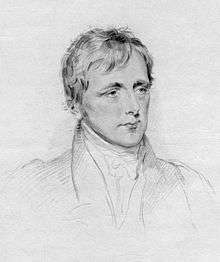John Ward, 1st Earl of Dudley
| The Right Honourable The Earl of Dudley PC FRS | |
|---|---|
 | |
| Secretary of State for Foreign Affairs | |
|
In office 30 April 1827 – 2 June 1828 | |
| Monarch | George IV |
| Prime Minister |
George Canning The Viscount Goderich The Duke of Wellington |
| Preceded by | George Canning |
| Succeeded by | The Earl of Aberdeen |
| Personal details | |
| Born | 9 August 1781 |
| Died | 6 March 1833 (aged 51) |
| Nationality | British |
| Political party | Tory |
| Alma mater | |
John William Ward, 1st Earl of Dudley, PC, FRS (9 August 1781 – 6 March 1833), known as the Honourable John Ward from 1788 to 1823 and as the 4th Viscount Dudley and Ward from 1823 to 1827, was a British politician. He served as Foreign Secretary from 1827 to 1828.
Background and education
Dudley was the son of William Ward, 3rd Viscount Dudley and Ward, and his wife Julia Bosville, and was educated at Oxford University (starting at Oriel College in 1798 and transferring to Corpus Christi College, Oxford as a Gentleman Commoner in 1800).
Political career
Dudley entered the House of Commons in 1802 as one of two representatives for Downton. He held this seat until 1803 and later represented Worcestershire from 1803 to 1806, Petersfield from 1806 to 1807, Wareham from 1807 to 1812, Ilchester from 1812 to 1819 and Bossiney from 1819 to 1823. The latter year he succeeded his father in the peerage and took his seat in the House of Lords.
In 1827 Ward was appointed Foreign Secretary under George Canning, a post he held also under Lord Goderich and the Duke of Wellington, resigning office in May 1828. In 1827 he was admitted to the Privy Council and created Viscount Ednam, of Ednam in the County of Roxburgh, and Earl of Dudley, of Dudley Castle in the County of Stafford. As foreign minister Ward was only a cipher; but he was a man of considerable learning and had some reputation as a writer and a talker. Dudley took an interest in the foundation of the University of London, and his Letters to Edward Copleston, the Bishop of Llandaff, were published by the bishop in 1840.
Personal life
Dudley died unmarried on 6 March 1833, aged 51. His two viscountcies and his earldom became extinct on his death while he was succeeded in his junior title of Baron Ward by his second cousin Reverend William Humble Ward. The Earl of Dudley’s Railway is named after him.
References
 This article incorporates text from a publication now in the public domain: Chisholm, Hugh, ed. (1911). "Dudley, Barons and Earls of". Encyclopædia Britannica (11th ed.). Cambridge University Press.
This article incorporates text from a publication now in the public domain: Chisholm, Hugh, ed. (1911). "Dudley, Barons and Earls of". Encyclopædia Britannica (11th ed.). Cambridge University Press.
External links
- Hansard 1803–2005: contributions in Parliament by the Earl of Dudley
.svg.png)